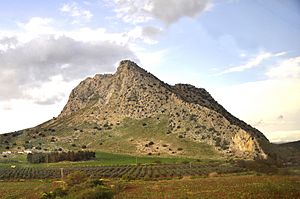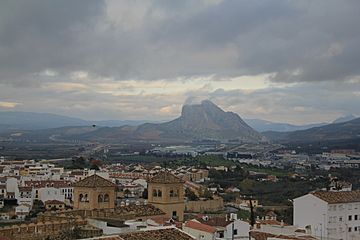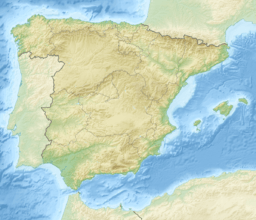Peña de los Enamorados facts for kids
Quick facts for kids Peña de los Enamorados |
|
|---|---|

Peña de los Enamorados seen from the railway line between Seville and Granada
|
|
| Official name: Antequera Dolmens Site | |
| Type | Cultural |
| Criteria | i, iii, iv |
| Designated | 2016 (40th session) |
| Reference no. | 1501-002 |
| Region | Europe and North America |
| Peña de los Enamorados | |
|---|---|

"Sleeping giant"
|
|
| Highest point | |
| Elevation | 880 m (2,890 ft) |
| Geography | |
| Location | Málaga Province, Andalusia |
| Parent range | Penibaetic System |
| Geology | |
| Mountain type | Limestone |
| Climbing | |
| Easiest route | From Antequera |
Peña de los Enamorados ("The Lovers' Rock") is a famous mountain in Spain. It is located near the city of Antequera in the Málaga Province of Andalusia. This mountain stands tall at 880 metres (about 2,887 feet) above sea level. It is known for its unique shape and the interesting stories connected to it.
Contents
What's in a Name? The Lovers' Rock Legend
The mountain gets its name from a sad but romantic local story. This legend has been passed down through generations.
The Legend of the Lovers
The most popular version of the legend tells of two young lovers. One was a young man from Antequera, and the other was a girl from nearby Archidona. They belonged to different families or groups that were rivals. Because their love was forbidden, they ran away together.
However, the girl's father and his men chased after them. To avoid being captured and separated, the young couple decided to jump from the top of the rock. They chose to be together forever, even in death. This tragic love story gave the mountain its name, "The Lovers' Rock."
Later, a writer named Robert Southey adapted this legend. In his story Laila and Manuel, the lovers were a Muslim girl and a Christian slave.
Columbus and the Mountain's Name
Even the famous explorer Christopher Columbus knew about this mountain's name. His chronicler, Bartolome de Casas, wrote down something Columbus said on October 29, 1492. Columbus was describing what he saw in Cuba. He said the mountains there were "lofty and beautiful, like the peña de las enamoradas." This shows how well-known the mountain was, even centuries ago.
The "Sleeping Giant" or "Indian's Head"
The mountain has another popular nickname: "Montaña del Indio." This means "Indian Mountain." If you look at the mountain from certain angles, it looks like the head of an American Indian lying down. Many people also call it the "Sleeping Giant" because of this unique shape. You can see why it's also called "Sleeping giant" in the infobox image.
Ancient History at Abrigo de Matacabras
At the base of Peña de los Enamorados, on its northwest side, there's a special place called the Abrigo de Matacabras. An "abrigo" is like a rock shelter or a small cave.
Link to the Dolmen of Menga
This shelter is very important because it's directly connected to the famous Dolmen of Menga. A dolmen is a type of ancient tomb made of large stones. The main entrance of the Menga dolmen points straight towards the Abrigo de Matacabras. This is quite unusual for ancient tombs in Europe. Most tombs are aligned with the sunrise on the summer solstice, but this one is different. It points north of that sunrise.
Ancient Cave Paintings and Discoveries
Inside the Abrigo de Matacabras, there are ancient cave paintings. These paintings are in a "schematic style," meaning they are simple drawings. A group of researchers called ATLAS from the University of Seville has studied these paintings in great detail.
Their research showed that these paintings are very old, probably from the beginning of the 4th millennium BC. That's over 6,000 years ago, during the Neolithic period (the New Stone Age)! This discovery proves how important the Abrigo de Matacabras was. It was likely a significant place for the people living in the region during the Stone Age. It shows a unique connection between the landscape, the cave, and the nearby dolmen.
See also
 In Spanish: Peña de los Enamorados para niños
In Spanish: Peña de los Enamorados para niños


